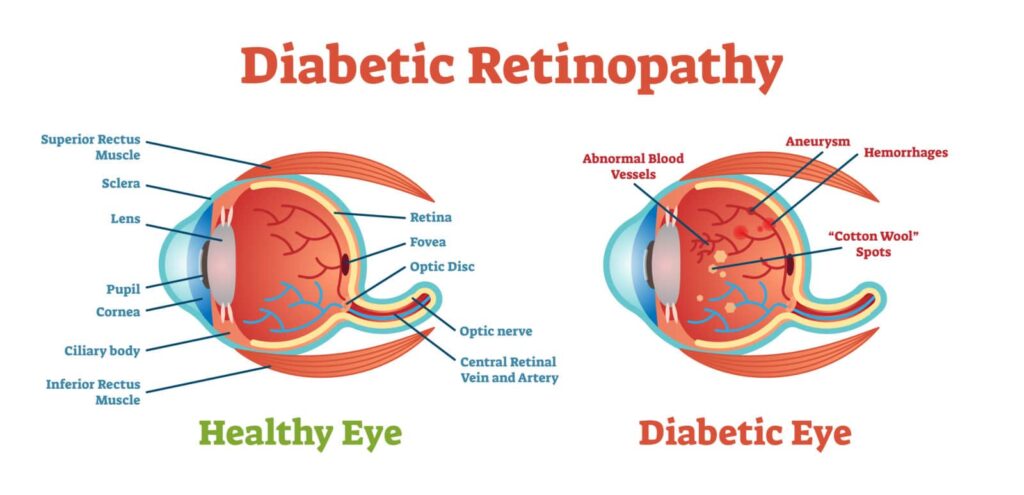Diabetic Retinopathy

Diabetic retinopathy is the most common cause of vision loss among people with diabetes. This condition involves changes to the light-sensitive tissue called the retina. The changes are due to blood vessels bleeding or leaking fluid, thus distorting vision.
How to get diagnosed
If you have diabetes and you are noticing vision changes, you need to let your primary doctor know and make an appointment with an ophthalmologist who is a retina specialist. At your complete eye exam, the ophthalmologist will look for:
- Abnormal blood vessels
- Swelling, blood and or fatty deposit in the retina
- Growth of new blood vessels and scar tissue
- Bleeding in the vitreous gel
- Retinal detachment
- Abnormalities in the optic nerve
- Vision, pressure, and health of the natural lens
When the diabetic retinopathy is mild, by controlling your diabetes and blood pressure, you can slow the progression. For anybody with diabetes, it is imperative that you follow your recommended diet by your nutritionist and take your prescribed medications.
Be proactive
When you come for your eye examination, be prepared to assist your doctor with the information needed for you to receive the most accurate examination:
- Write a brief summary of your diabetic history
- List of medicines, vitamins, and supplements you are taking
- List of symptoms
- List of family members who may have the same or other eye conditions
- List of questions
Treatments
A retinal specialist will determine when a diabetic retinopathy case needs medical intervention. To stop the leaking of blood vessels, there are a few options for the doctor to recommend:
- Photocoagulation/Panretinal Photocoagulation is a laser treatment that shrinks abnormal blood vessels. During the laser procedure, the selected area is lasered by an Argon laser, thus shrinking the abnormal new and weak blood vessels.
- Vitrectomy is performed by making a tiny incision in the eye to remove the vitreous gel and the blood leaked by the abnormal blood vessels.
- Anti-VEGF medications are injected into the vitreous. These medications are called vascular endothelial growth factor inhibitors. Anti-VEGF meds stop the growth of the weak and abnormal blood vessels and therefore lower the chance of blood leakage.
Diabetes is a lifelong condition; therefore, careful management of the health of your retina is essential to prevent or slow down any other vision-debilitating conditions from arising. It is critical to a patient with diabetic retinopathy that you keep your appointments and follow the doctor’s instructions. Your eyesight is a precious gift. Call us for an appointment with Dr. Oteiza for Retina Care and Dr. Luchs for Cataract needs at Katzen Eye Care at 561-732-8005.

